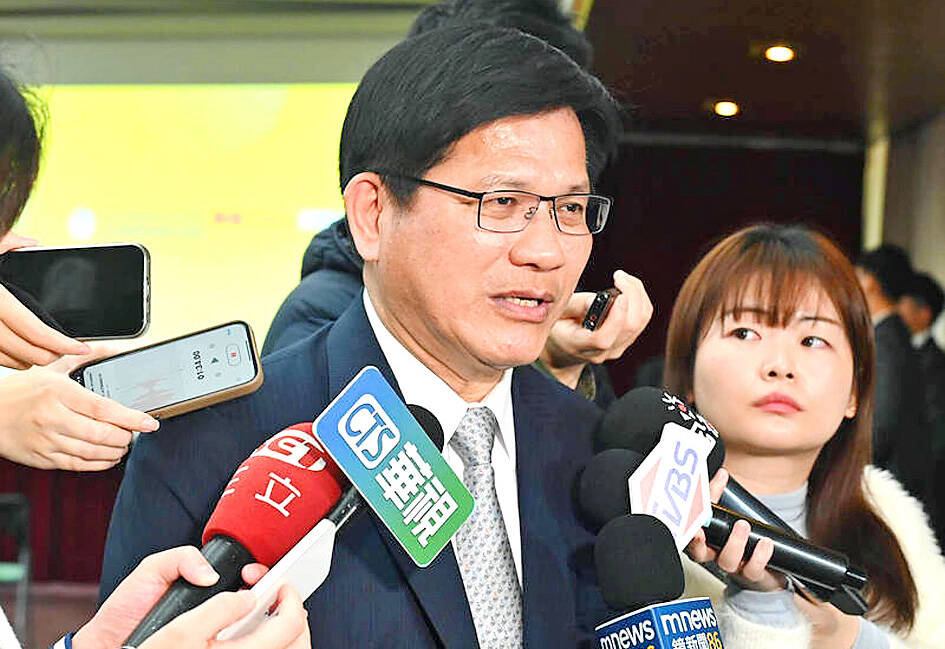Peace and stability in the Taiwan Strait is an international consensus and of common interest, Minister of Foreign Affairs Lin Chia-lung (林佳龍) said yesterday as he welcomed top diplomats from the US, Japan and South Korea reiterating in a joint statement the importance of maintaining peace and stability across the Taiwan Strait.
US Secretary of State Marco Rubio, Japanese Minister of Foreign Affairs Takeshi Iwaya and South Korean Minister of Foreign Affairs Cho Tae-yul on Saturday held their first meeting following the inauguration of US President Donald Trump on the sidelines of the Munich Security Conference in Germany.
Following their meeting, the US Department of State released a “Joint Statement on the Trilateral United States – Japan – Republic of Korea Meeting in Munich.”

Photo: Taipei Times
The statement said that the secretary and foreign ministers “emphasized the importance of maintaining peace and stability across the Taiwan Strait as an indispensable element of security and prosperity for the international community.”
“They encouraged the peaceful resolution of cross-strait issues and opposed any attempts to unilaterally force or coerce changes to the status quo,” it said, adding that “they expressed support for Taiwan’s meaningful participation in appropriate international organizations.”
The statement also said they “emphasized their commitment to maintaining a free and open Indo-Pacific and ensuring international law prevails.”
Rubio, Iwaya and Cho “reaffirmed their commitment to upholding shared principles, including respect for democracy, sovereignty and the rule of law” and “made clear they stand shoulder to shoulder against any effort to destabilize democratic institutions, economic independence and global security.”
In Taipei, the Ministry of Foreign Affairs (MOFA) in a news release cited Lin as saying that the ministry welcomes and thanks the three top diplomats for jointly reiterating their support for peace and stability across the Taiwan Strait, and their opposition to any attempts to unilaterally force or coerce changes to the “status quo.”
The joint statement came on the heels of the “US-Japan Leaders’ Joint Statement” issued after Trump met with Japanese Prime Minister Ishiba Shigeru in Washington earlier this month, the ministry said.
Like-minded partners have again highlighted that maintaining peace and stability across the Taiwan Strait has become a consensus and common interest of the international community, and is relevant to the welfare of all countries, as well as regional and global peace and prosperity, it said.
The ministry welcomes the international community paying close attention to peace and stability across the Taiwan Strait, and showing concern about China’s use of “gray zone” tactics and economic coercion to threaten the “status quo” in the area, it said.
As a responsible member of the international community, Taiwan would continue to strengthen national defense capabilities and economic resilience, and coordinate closely with like-minded nations to ensure peace, stability and prosperity across the Taiwan Strait and throughout the Indo-Pacific region, the ministry said.

NATIONAL SECURITY THREAT: An official said that Guan Guan’s comments had gone beyond the threshold of free speech, as she advocated for the destruction of the ROC China-born media influencer Guan Guan’s (關關) residency permit has been revoked for repeatedly posting pro-China content that threatens national security, the National Immigration Agency said yesterday. Guan Guan has said many controversial things in her videos posted to Douyin (抖音), including “the red flag will soon be painted all over Taiwan” and “Taiwan is an inseparable part of China,” while expressing hope for expedited “reunification.” The agency received multiple reports alleging that Guan Guan had advocated for armed reunification last year. After investigating, the agency last month issued a notice requiring her to appear and account for her actions. Guan Guan appeared as required,

A strong cold air mass is expected to arrive tonight, bringing a change in weather and a drop in temperature, the Central Weather Administration (CWA) said. The coldest time would be early on Thursday morning, with temperatures in some areas dipping as low as 8°C, it said. Daytime highs yesterday were 22°C to 24°C in northern and eastern Taiwan, and about 25°C to 28°C in the central and southern regions, it said. However, nighttime lows would dip to about 15°C to 16°C in central and northern Taiwan as well as the northeast, and 17°C to 19°C elsewhere, it said. Tropical Storm Nokaen, currently

PAPERS, PLEASE: The gang exploited the high value of the passports, selling them at inflated prices to Chinese buyers, who would treat them as ‘invisibility cloaks’ The Yilan District Court has handed four members of a syndicate prison terms ranging from one year and two months to two years and two months for their involvement in a scheme to purchase Taiwanese passports and resell them abroad at a massive markup. A Chinese human smuggling syndicate purchased Taiwanese passports through local criminal networks, exploiting the passports’ visa-free travel privileges to turn a profit of more than 20 times the original price, the court said. Such criminal organizations enable people to impersonate Taiwanese when entering and exiting Taiwan and other countries, undermining social order and the credibility of the nation’s

‘SALAMI-SLICING’: Beijing’s ‘gray zone’ tactics around the Pratas Islands have been slowly intensifying, with the PLA testing Taiwan’s responses and limits, an expert said The Ministry of National Defense yesterday condemned an intrusion by a Chinese drone into the airspace of the Pratas Islands (Dongsha Islands, 東沙群島) as a serious disruption of regional peace. The ministry said it detected the Chinese surveillance and reconnaissance drone entering the southwestern parts of Taiwan’s air defense identification zone early yesterday, and it approached the Pratas Islands at 5:41am. The ministry said it immediately notified the garrison stationed in the area to enhance aerial surveillance and alert levels, and the drone was detected in the islands’ territorial airspace at 5:44am, maintaining an altitude outside the effective range of air-defense weaponry. Following